
Photo from wikipedia
The A2 adenosine receptors play an important role, among others, in the regulation of inflammatory process and glucose homeostasis in diabetes and obesity. Thus, the presented project evaluated of influence… Click to show full abstract
The A2 adenosine receptors play an important role, among others, in the regulation of inflammatory process and glucose homeostasis in diabetes and obesity. Thus, the presented project evaluated of influence of the selective antagonist of A2A adenosine receptor—KD-64 as compared to the known non-selective antagonist—caffeine on these two particular processes. Two different inflammation models were induced namely local and systemic inflammation. Obesity was induced in mice by high-fat diet and the tested compounds (KD-64 and caffeine) were administrated for 21 days. KD-64 showed anti-inflammatory effect in both tested inflammation models and administered at the same dose as ketoprofen exerted stronger effect than this reference compound. Elevated levels of IL-6 and TNF-α observed in obese control mice were significantly lowered by the administration of KD-64 and were similar to the values observed in control non-obese mice. Interestingly, caffeine increased the levels of these parameters. In contrast to caffeine which had no influence on AlaT activity, KD-64 administration significantly lowered AlaT activity in the obese mice. Although, contrary to caffeine, KD-64 did not reduce diet-induced obesity in mice, it improved glucose tolerance. Thus, the activity of the selective adenosine A2A receptor antagonist was quite different from that of the non-selective.
Journal Title: PLoS ONE
Year Published: 2020
Link to full text (if available)
Share on Social Media: Sign Up to like & get
recommendations!